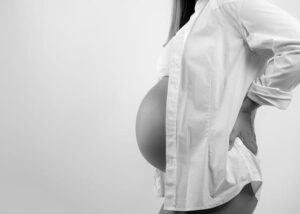Morning Sickness
 Morning sickness affects 50% to 90% of all pregnant women, leading to complaints of nausea and vomiting in early pregnancy. 1 Hyperemesis gravidarum (HG) is the extreme form of morning sickness, occurring between the fourth and sixth week of pregnancy, causing intractable vomiting; dehydration; electrolyte disturbance; a 5% weight loss with ketosis; disturbed nutrition; acid aspiration; retinal, kidney, or hepatic damage; or neurological alterations in some individuals.1,2 Both conditions can significantly impact the quality of life of those who experience it.3
Morning sickness affects 50% to 90% of all pregnant women, leading to complaints of nausea and vomiting in early pregnancy. 1 Hyperemesis gravidarum (HG) is the extreme form of morning sickness, occurring between the fourth and sixth week of pregnancy, causing intractable vomiting; dehydration; electrolyte disturbance; a 5% weight loss with ketosis; disturbed nutrition; acid aspiration; retinal, kidney, or hepatic damage; or neurological alterations in some individuals.1,2 Both conditions can significantly impact the quality of life of those who experience it.3
Regarding prescription medications used in the treatment of morning sickness, an FDA-assigned pregnancy category A indicates that adequate and well-controlled studies have not demonstrated a risk to the fetus in the first trimester of pregnancy and that there is no evidence of risk in later trimesters.1 Currently, there are no prescription medications for the treatment of morning sickness that are classified with a pregnancy category A. Due to the fact that many pharmacological agents usually prescribed for this condition may also induce symptoms of morning sickness and that research is not conducted on pregnant women due to the uncertainty of the teratogenic effects of medications, acupuncture is a viable alternative for treating pregnant patients seeking relief.
Research and acupuncture for morning sickness
Several studies have been done on acupuncture and morning sickness. A meta analysis on electro-acupuncture and acupuncture in pregnancy has shown that electro-acupuncture and acupressure reduced nausea and vomiting. And a 2011 literature review by Freels shows that acupressure on P6 reduces the nausea symptoms.
Nausea and Chinese medicine
It is interesting that most of the research has been done using one specific acupuncture point P6. Situated on the inside of the arm, this point is well known for its anti-nausea properties. It is also very easy to find. That’s one of the reasons why it is used with travel sickness bands. However, there are many more points combinations that can be used in Chinese Medicine to help and support pregnant women.
As it is usually the case, there is no direct relationship between the Western diagnosis of ‘morning sickness’ and one single Chinese Medicine diagnosis. A full history will allow the acupuncturist to make his diagnosis and establish the points prescription specific to that particular woman. The practitioner will also be able to give some dietary advice depending on the diagnosis.
Other Benefits of Acupuncture During Pregnancy
Many people credit acupuncture for easing a wide range of pregnancy symptoms including heartburn, swelling in the legs, constipation, carpal tunnel syndrome, sciatica and more.
Here are some of the pregnancy symptoms acupuncture can relieve that science has studied:
Lower back and pelvic pain
Research published in the American Journal of Obstetrics & Gynecology reports acupuncture could reduce pain in the lower back along with pelvic pain. And a 2015 Cochrane Review for treating low back/pelvic pain in pregnancy found that acupuncture improved pelvic pain more than usual prenatal care.
Depression
Depression during pregnancy is common, affecting nearly one in four women — but a targeted type of acupuncture may help. For a 2010 study published in the journal Obstetrics & Gynecology, during eight weeks clinically-depressed pregnant women who weren’t previously taking antidepressants received general acupuncture, acupuncture specific for depression, or massage. The severity of depression symptoms decreased most among women who received acupuncture for depression. And 63 percent of the women who received the depression-specific acupuncture responded to the treatment, compared to 44 percent in the general acupuncture and massage groups.
Headaches
Research has shown that acupuncture can reduce pregnancy-induced headaches; women who received it also used less medication.
Sleep Problems
Getting to sleep and staying asleep is trickier than ever during pregnancy — but some research has shown that women who receive acupuncture sleep better during pregnancy, too.
For more information about how acupuncture and other treatments can help you, please contact the Urban Acupuncture Center Board Certified Licensed Acupuncturist’s team at Indianola Ave, Clintonville (614) 725-2488 | Main St, Westerville (614) 426-4406 or click here. Taking new patients in and around greater Columbus, Ohio.
